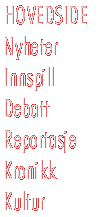
|
|
Redaktør: Teknisk ansvarlig:
|
|
Spørsmål angående
engelsk kan stilles til språkrådgiver Stewart
Clark, Studieavdelingen, e-post: stewart.clark@adm.ntnu.no,
English translations
A group of staff in the Division of Student and Academic Affairs has agreed on the following English translations for some central terms connected with teaching and examinations. We hope this list will be useful. aktuelle emner Selected course units emner Course units emneeksamen (10 vt.) Course examination (10 credits) grunnemne Basic course unit grunnfag mellomfagstillegg mellomfag påbygning til 40 vt. Further intermediate
course hovedfagsemne Advanced course unit hovedfag Graduate study / Graduate subject hovedfagsgrad Graduate degree hovedfagsoppgave Thesis / Graduate thesis hovedfag, fordypning Specialization at graduate level avsluttende delprøve Final examination muntlig prøve (hovedfag) Oral examination (graduate level) hjemmeeksamen Written home examination semesteroppgave Term paper øving Practical course / laboratory exercise prosjektoppgave Project work valgfrie emner Elective subjects valgfrie vekttall Elective subjects allmenn del Compulsory subjects obligatorisk del Compulsory subjects spesialpensum Individually selected syllabus fri emnekrets Individually selected subjects selvvalgt pensum Syllabus selected by student examen philosophicum examen philosophicum lavere grad Undergraduate degree høyere grad Graduate degree profesjonsgrad Professional degree magistergrad Magister degree doktorgrad Doctoral degree Praktisk-pedagogisk Practical Pedagogical Education
/ Tricky words liqueur, liquor Liqueur (Norw. likør) means a strong, sweet alcoholic drink: «We have cognac and several liqueurs». In British English, the second syllable rhymes with «cure». In American English, it rhymes with «cur». Liqueur originates from the French «liquor». Liquor (Norw. brennevin) means distilled spirits in a non-technical sense. Occasionally, liquor may refer to any alcoholic drink. This is prounced «licker». facies, faces, faeces These words sound fairly Facies (Norw. facies) in Faces (Norw. ansikt, flate, side) is the plural of face and means the front of a person's head or the surface of a thing such as the face of the Earth or the climb up the north face of the Eiger. Faces can also be aspects, as in the two faces of capitalism (twin effects). Faces is pronounced «fay-sis». Faeces (Norw. avføring) means
excrement. This is Enlightening English A researcher in petroleum engineering wrote a paper which a first sight was all about «liquid entertainment». It turned out that he had written «liquid entrainment», but Word's automatic correction was on and in a party mood. The Municipality of Trondheim introduced
|

 Stewart's
Corner
Stewart's
Corner